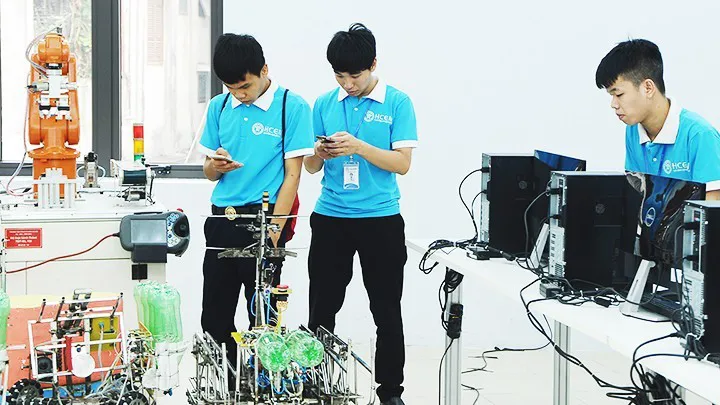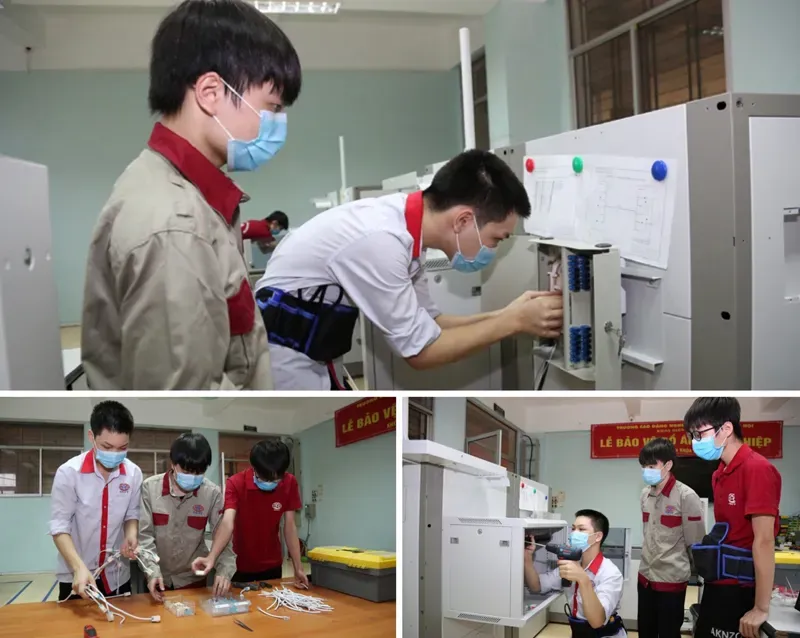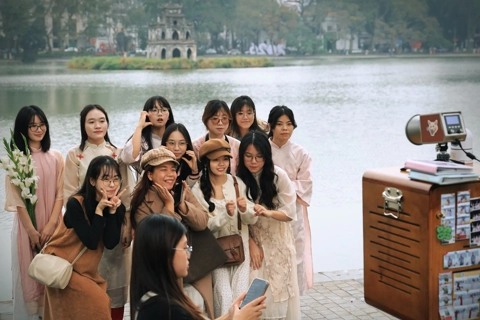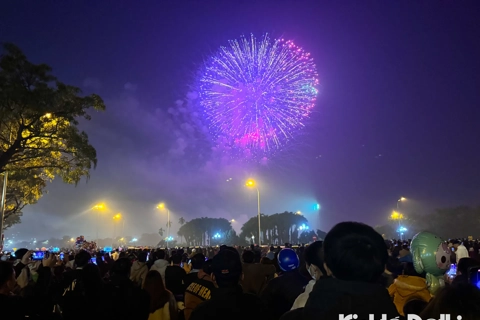Hanoi develops quality manpower
Hanoi is developing qualified workforce to make it one of the driving forces for sustainable development and international integration.
THE HANOI TIMES — Hanoi has issued a series of mechanisms that offer incentives to attract talent and train them to develop high-quality human resources.
Luu Minh Phuc, a student at the Hanoi College of Electronics and Refrigeration, recognized the opportunities from the city government's groundbreaking policies to develop science and technology.
"The semiconductor and microchip industry alone needs about 10,000 college graduates every year, so I see great potential for employment or further research," Phuc told The Hanoi Times.
Nguyen Duc Tuan Tu, a student at the same university, shares a similar perspective: "Hanoi now strongly invests in research institutes and offers scholarships to students and those with groundbreaking research. So I hope to do research and continue my education."

A hands-on training session for students from the Hanoi College of Electronics and Refrigeration. Photos: Nhan Dan Newspaper
In a sharing with Hanoimoi Newspaper recently, Nguyen Ngoc Tuan, Chairman of the Hanoi People's Council, said that the capital city has always placed emphasis on human resource development, considering it one of the key driving forces for its sustainable development.
"Hanoi has put in place a national strategy with specific mechanisms to recruit talent, especially in the public sector, as well as domestic and international talent, especially in key sectors such as science, technology, and education," Tuan said.
He urged local authorities to coordinate with universities and schools to identify young talents at an early stage to improve training quality. In particular, he encourages the renovation of training and retraining programs to maximize capacity development.
In addition, the city's incentives have been applied to attract lecturers who are experienced domestic and international experts, scientists, leaders and business managers, with special focus on inviting overseas Vietnamese professors and leading experts to work and lecture in the city.
It also requires non-public schools to participate in the research and training of quality human resources for the country. Schools are encouraged to develop programs for cooperation with reputable foreign counterparts.
Diversify training programs to develop human resources

At a training center of the Hanoi High Technology Vocational College. Photo: Kinh te & Do thi Newspaper
To meet reality-based requirements, local schools have changed their training curricula over the past years. Thanh Xuan District has two educational institutions recognized as high-quality standards, including Thanh Xuan Secondary School and Hanoi Inter-Level Private School. In the period 2021-2025, the district has invested in the construction, renovation, and upgrading of 28 public school projects.
As for Nam Tu Liem District, as of March 2025, three schools are implementing the quality education model according to the Capital Law. The schools proactively develop advanced educational programs.
At a recent working session of the National Assembly (NA)’s Standing Committee, the NA Deputy Chairman Nguyen Thi Thanh highly appreciated the results achieved by Hanoi in implementing policies and laws on the utilization of human resources in the new era.
She suggested that Hanoi should promote education reform and focus on high-quality human resources for development.
"Hanoi must focus on developing key industries, especially in information technology skills, foreign languages, and modern teaching methods. It is also necessary to modernize facilities and promote work-based learning," Thanh said.
The Hanoi Department of Education and Training has recently announced the Higher Education Network Plan for 2026-2030, with a vision up to 2050.
Vietnam has unveiled an ambitious plan to modernize and expand its higher education and pedagogical network by 2030, aiming to build a synchronous, modern system with balanced scale, structure, and regional distribution. The strategy also envisions an open education system designed to better meet learning demands and national development needs.
The roadmap sets a target of over 3 million learners enrolled in higher education, aiming for a ratio of 260 university students and 23 postgraduates per 10,000 people. By 2030, at least 33% of young adults aged 18–22 are expected to hold university degrees, with a nationwide minimum threshold of 15%.
The plan also calls for a highly qualified academic workforce, with at least 7.2% of lecturers holding master's degrees and 0.8% holding doctorates. Training in science, technology, engineering, and mathematics (STEM) is set to comprise 35% of the total enrollment.
To boost innovation and research, the government will establish major higher education hubs in Hanoi, Danang, Ho Chi Minh City, and Cantho, focusing on scientific research, technology development, and entrepreneurship.
Priority investment projects include upgrading and expanding national universities, enhancing institutions that specialize in teacher training, engineering, and technology, and developing regional universities. The plan also emphasizes relocating universities out of crowded urban centers in Hanoi and Ho Chi Minh City to ease congestion and improve infrastructure.
These programs are designed to prepare the workforce for a rapidly changing economy, particularly in areas such as artificial intelligence, cloud computing, and e-commerce, digital technology, and tourism.












